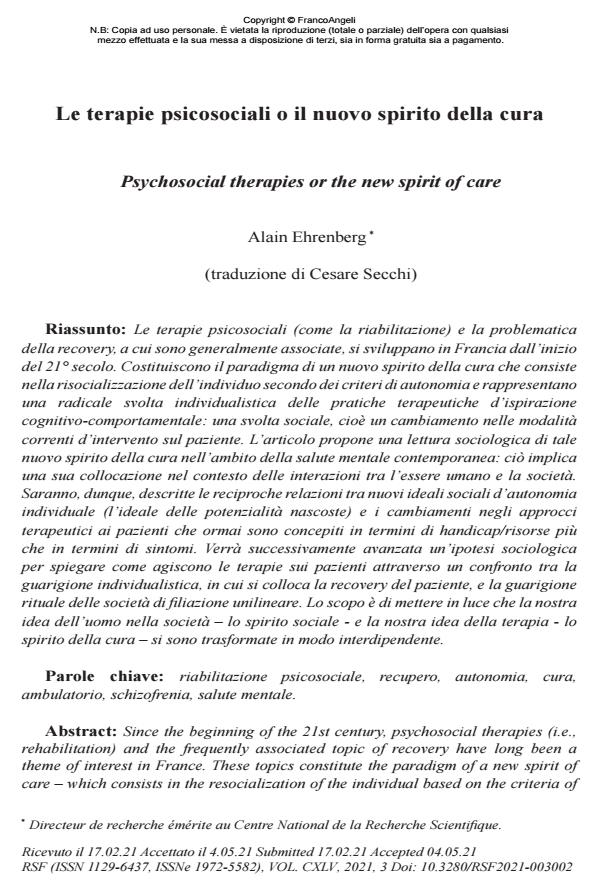Le terapie psicosociali o il nuovo spirito della cura
Titolo Rivista RIVISTA SPERIMENTALE DI FRENIATRIA
Autori/Curatori Alain Ehrenberg
Anno di pubblicazione 2021 Fascicolo 2021/3
Lingua Italiano Numero pagine 18 P. 9-26 Dimensione file 200 KB
DOI 10.3280/RSF2021-003002
Il DOI è il codice a barre della proprietà intellettuale: per saperne di più
clicca qui
Qui sotto puoi vedere in anteprima la prima pagina di questo articolo.
Se questo articolo ti interessa, lo puoi acquistare (e scaricare in formato pdf) seguendo le facili indicazioni per acquistare il download credit. Acquista Download Credits per scaricare questo Articolo in formato PDF

FrancoAngeli è membro della Publishers International Linking Association, Inc (PILA), associazione indipendente e non profit per facilitare (attraverso i servizi tecnologici implementati da CrossRef.org) l’accesso degli studiosi ai contenuti digitali nelle pubblicazioni professionali e scientifiche.
Le terapie psicosociali (come la riabilitazione) e la problematica della recovery, a cui sono generalmente associate, si sviluppano in Francia dall’inizio del 21° secolo. Costituiscono il paradigma di un nuovo spirito della cura che consiste nella risocializzazione dell’individuo secondo dei criteri di autonomia e rappresentano una radicale svolta individualistica delle pratiche terapeutiche d’ispirazione cognitivo-comportamentale: una svolta sociale, cioè un cambiamento nelle modalità correnti d’intervento sul paziente. L’articolo propone una lettura sociologica di tale nuovo spirito della cura nell’ambito della salute mentale contemporanea: ciò implica una sua collocazione nel contesto delle interazioni tra l’essere umano e la società. Saranno, dunque, descritte le reciproche relazioni tra nuovi ideali sociali d’autonomia individuale (l’ideale delle potenzialità nascoste) e i cambiamenti negli approcci terapeutici ai pazienti che ormai sono concepiti in termini di handicap/risorse più che in termini di sintomi. Verrà successivamente avanzata un’ipotesi sociologica per spiegare come agiscono le terapie sui pazienti attraverso un confronto tra la guarigione individualistica, in cui si colloca la recovery del paziente, e la guarigione rituale delle società di filiazione unilineare. Lo scopo è di mettere in luce che la nostra idea dell’uomo nella società - lo spirito sociale - e la nostra idea della terapia - lo spirito della cura - si sono trasformate in modo interdipendente.
Parole chiave:riabilitazione psicosociale, recupero, autonomia, cura, ambulatorio, schizofrenia, salute mentale.
Alain Ehrenberg, Le terapie psicosociali o il nuovo spirito della cura in "RIVISTA SPERIMENTALE DI FRENIATRIA" 3/2021, pp 9-26, DOI: 10.3280/RSF2021-003002